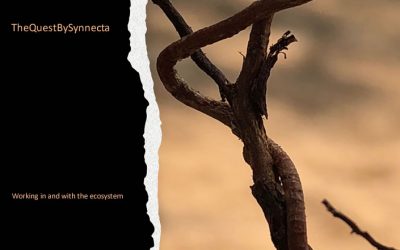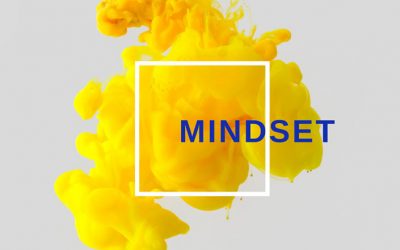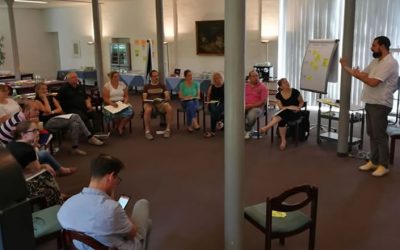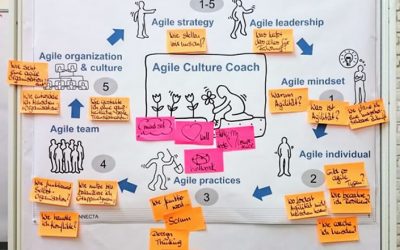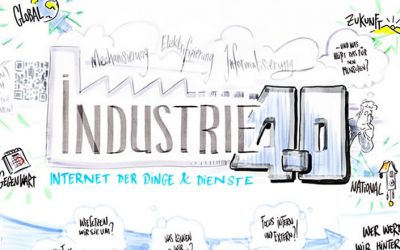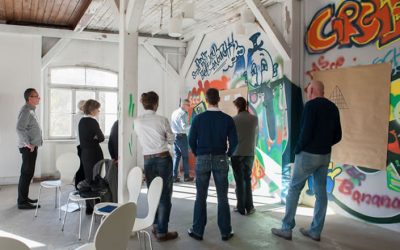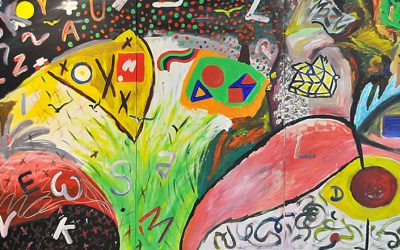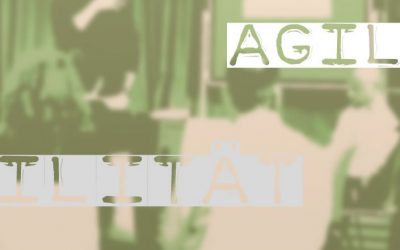SYNNECTA Blog
Organizational Development
Culture and strategy. Do we have to choose one over the other?
Black and white. Good and evil. Anima and animus. Emotional and rational. Social and personal. Is life made of dualities? Strategy and culture are one of these dualities we often encounter business-wise. Are we talking about opposing forces? Dichotomies seem to give...
Virtual OD by SYNNECTA – Go digital!
The digital world is a great source of new potential for organizations to foster a cultural change that is more democratic and more tuned into the future in order to address the challenges of an increasingly complex and dynamic world. In future, culture will be even...
TheQuestBySynnecta – What are we for?
People in organizations expect a credible answer to this question in order to be able to establish a context for their work that delivers a sense of both purpose and meaning. Reacting to such challenges, companies position themselves with a company purpose. Until now,...
WE, the Company – the Dynamics of Shaping Identities
It is a well-known challenge: how can an organization gain and maintain a recognizable identity that gives direction to the conduct of its entire team? The history of large companies is usually shaped by mergers. Surprisingly, we often find deep-rooted and dominant...
Some Thoughts about Mindset: a trending term
How we see the world, and what we know about it, is shaped by what has gone before: it is conditional. The notion that our perception and understanding creates an image of the world has long been doubted. At least since the time of Kant, we have known that perception...
Spectrum of Balance – A cultural model for organizations
The cultural model »Spectrum of Balance« was developed by SYNNECTA in co-creation with partners at other companies. It gives culture a language and thus people in organizations a basis for reflection and discussion. The model is descriptive and not normative. It is...
The Return of the Crowd
The phenomenon of the crowd became the focus of theoretical thinking in the beginning of the last century. Beginning from Gustave Le Bon’s theories, Elias Canetti, Hermann Broch and Sigmund Freud were among those who addressed this new fact in politics and society....
Why diversity is a driver of innovation
Use the variety of perspectives in your company to become more creative How do we become more innovative? This question is becoming increasingly urgent for many companies to keep up with the competition. Without innovation, time is running out for many companies. The...
How you successfully manage the digital transformation with the seven fundamental processes
In the last blog article we explained why the digital transformation is not just yet another change – and how you can master it. It has become clear that the digital transformation represents a fundamental change. And it demonstrated how a holistic approach can...
Why the digital transformation is not just yet another change – and how you can master it
Digital transformation is a fundamental change that can only be fully understood with a holistic model approach. The seven essential elements of an organization and their interrelationships can be well understood using the example of the digital transformation of a...
Mindset – our basic thesis
Basic Thesis Each person acts from an individual mindset [as part of the personality]. Human communities act from a collective mindset [as part of culture]. What is a Mindset? A mindset comprises personal or collective dominant attitudes and thought patterns, as well...
ExEdService Pack – a useful database for your Leadership development
You are searching for an experienced speaker? Dr. Rüdiger Müngersdorff is listed at EdEx. Leadership development made easy: An ExEdService Pack that not only provides an excellent overview, but also direct access to more than 100 trainers from the best business...
SYNNECTA‘s position in the dynamics of New Work and Company Designs
A Beginning There’s so much to say. A lot about: New Organization, New Work, New Mindset. Five years ago, a brief speech would have sufficed. Now, there’s so much more to talk about: there are too many facets, too much variance. Let us highlight only a few of the...
Mental Change? Agile organizations need new »identities«
On the agile triangle (methods, structure, culture), one of the most difficult aspect remains that of cultural change; that is neither new nor surprising. What we call culture is a combination of many factors that cannot be grasped by causal thought and are therefore...
Agile organizations and their growing pains
The group was silent. They stayed silent, even as the inviting manger tried to send an optimistic and constructive message. Questions were ignored or answered with vague and irrelevant responses. Although the conversation livened up a little in smaller groups, it...
A plea for learning by experience in group dynamics and against the over-methodization of agile procedures
Among the employees and managers we meet who work in agile environments, more and more have recently asked us how to deal with dominant informal leaders. Both sociometry and group dynamics know informal leadership as a key phenomenon: it is a frequent cause of a range...
Agile Teams & Collaboration/Conflicts
Does »Agility« and »Controlling« fit together? On the ICV ControllingBlog Hans-Peter Sander, Head of the ICV Team PR/New Media, tells about his Agile Culture Coach training that he completed in five modules in 2017 at SYNNECTA. Today: »Agile Teams and Collaboration«...
Agility needs Diversity
Agility is the answer enterprises have found to a changed world and to a changed context of doing business. Society, markets and the competitive landscape have changed to possess a greater degree of contingency - in the phrasing of companies today, this is known as...
Agile Methods and Scrum
Does »Agility« and »Controlling« fit together? The big Munich »Controller Congress« had the title »Agile Controlling in the digital reality – managing upheavals successfully?«. I received a fantastic offer: Deep immersion into the subject during a professional...
Why agility and diversity belong together
»Not yet an answer« Consider a group of people. They are all different, not the same, but they have one thing in common: they work together. They were told that work these days needs agility, and diversity. Everyone nodded in agreement. All of them have the same...
»The tale of one who set out to learn agility«
»Agility« and »management control« – that's a match! Even this year's large Munich »Controller Congress« agreed when they titled the event »Agile controlling in digital reality: Managing upheavals successfully«, didn't they? Or is it not a match after all, as some...
Why dynamic skills are becoming so important now
The demands on organisations are growing steadily, while the private and business world is becoming more complex and increasingly less predictable. As the recent past has clearly shown, we are challenged daily by issues which are always good for surprises: not only...
»The World in Upheaval« – Book launch at the Mercator Foundation Berlin
The book »Anders wirtschaften – Integrale Impulse für eine plurale Ökomomie« (Economising Differently – Integral Impulses for a Plural Ecomomy) provides an approach to achieve a systemic understanding of corporate organisation and leadership. On Tuesday,...
Industry 4.0
It is currently the main economic issue, and there is hardly any topic whereby the impact on industry and society is discussed so controversially. When it comes to the question of how digitalisation changes the working world, different opinions determine the public...
Agile Talent Management (II): New Formats and Interventions
I described the fundamental aspects of agile talent management in my last blog post on the topic of talent management: a development-guided notion of talent, talent enabling, self-organization and a supportive talent culture. Building on that, I will now propose...
Agile Talent Management (I): What is talent management in a situation of constant change?
The form of talent management I witness in many organizations is maintained via talent identification and process management. Yet, these inflexible models are rarely able to permit the flexibility that is required in complex, agile environments. If talent management...
Strategic Simulation Game – SYNNECTA Global Logistics
This is a game of six stations with set game boards and role ascriptions, thirty-five players, a range of supply concepts, several thousand Lego bricks, a great number of containers, lorries and ships. It is the goal of this game of quick rounds to produce eight Lego...
Age!
»A society that cannot bear old age will be destroyed by its own selfishness.« Willy Brandt How old are you? When I was six, I thought I was old - I was, after all, about to start school. When I was eighteen, I did not feel like an adult. And now? I feel young,...
Supervisions: Visiting places of modern and hyper-modern art
In Berlin, people are queueing up to see an exhibition comparing expressionist and impressionist painting. It is a very regulated experience of art: this is well established, known art. There will not be any exceeding challenges, irritations or surprises. Here, on the...
Dimensions of Agility
»Agility« has become a key term for anyone keen to show that they are »ahead of the times«. Yet, at the same time, use of the word often elicits negative reactions and rejection. Beyond showmanship and buzzword bingo, however, the term hides valuable notions and...



